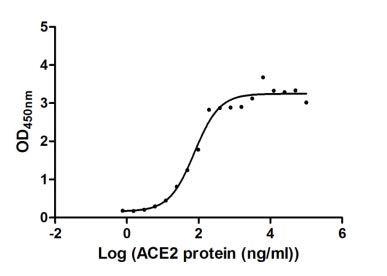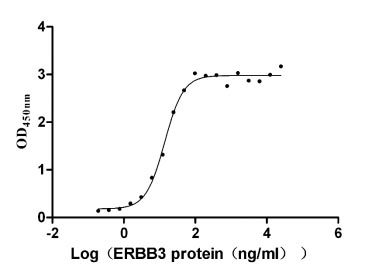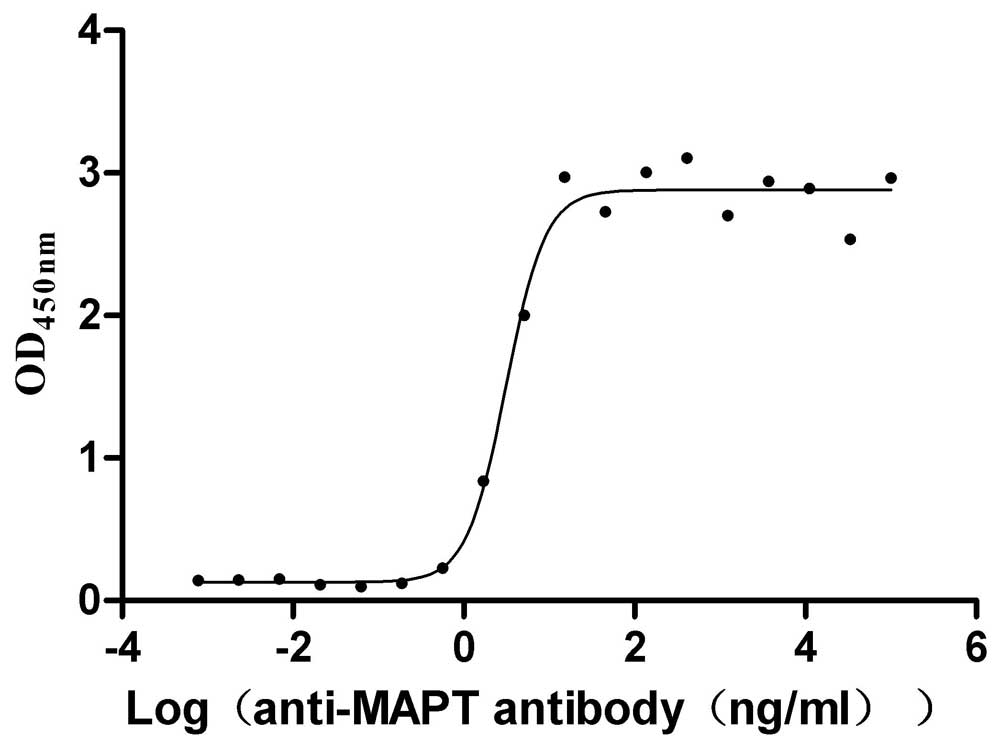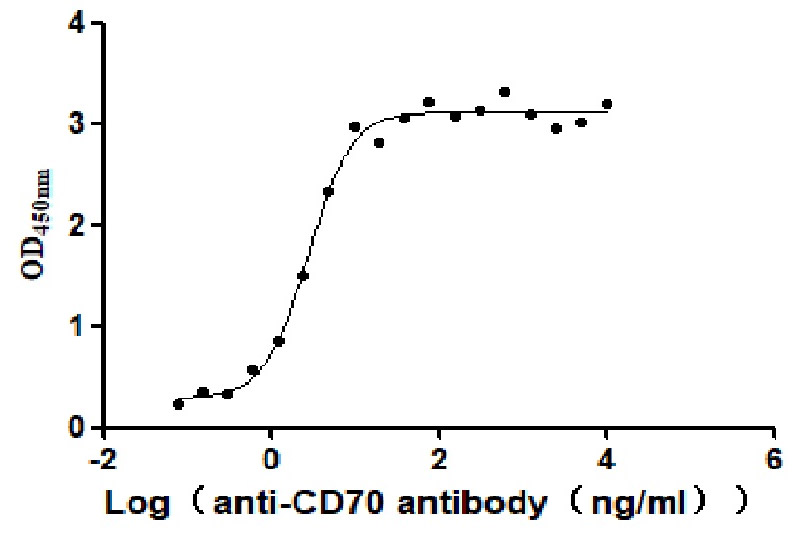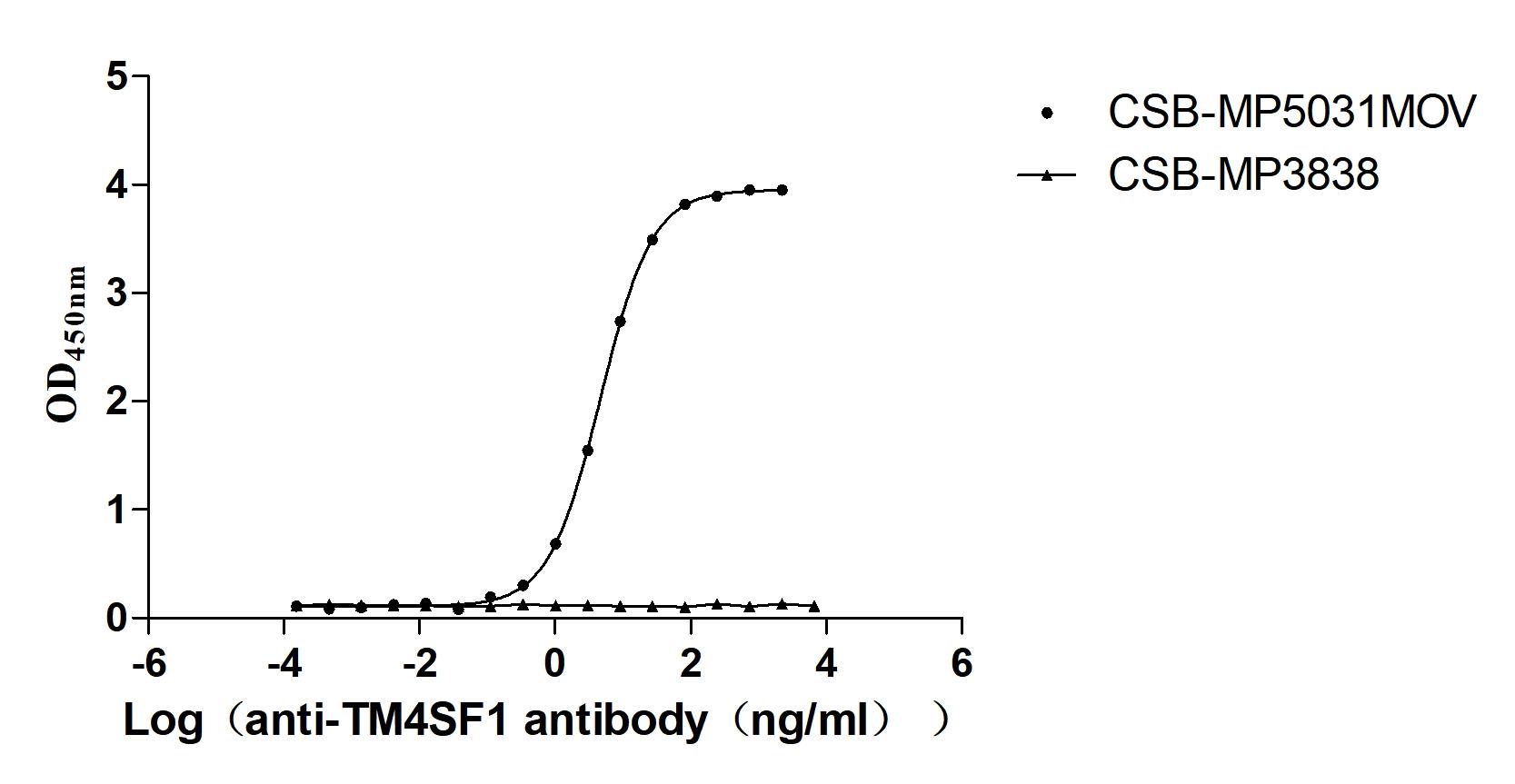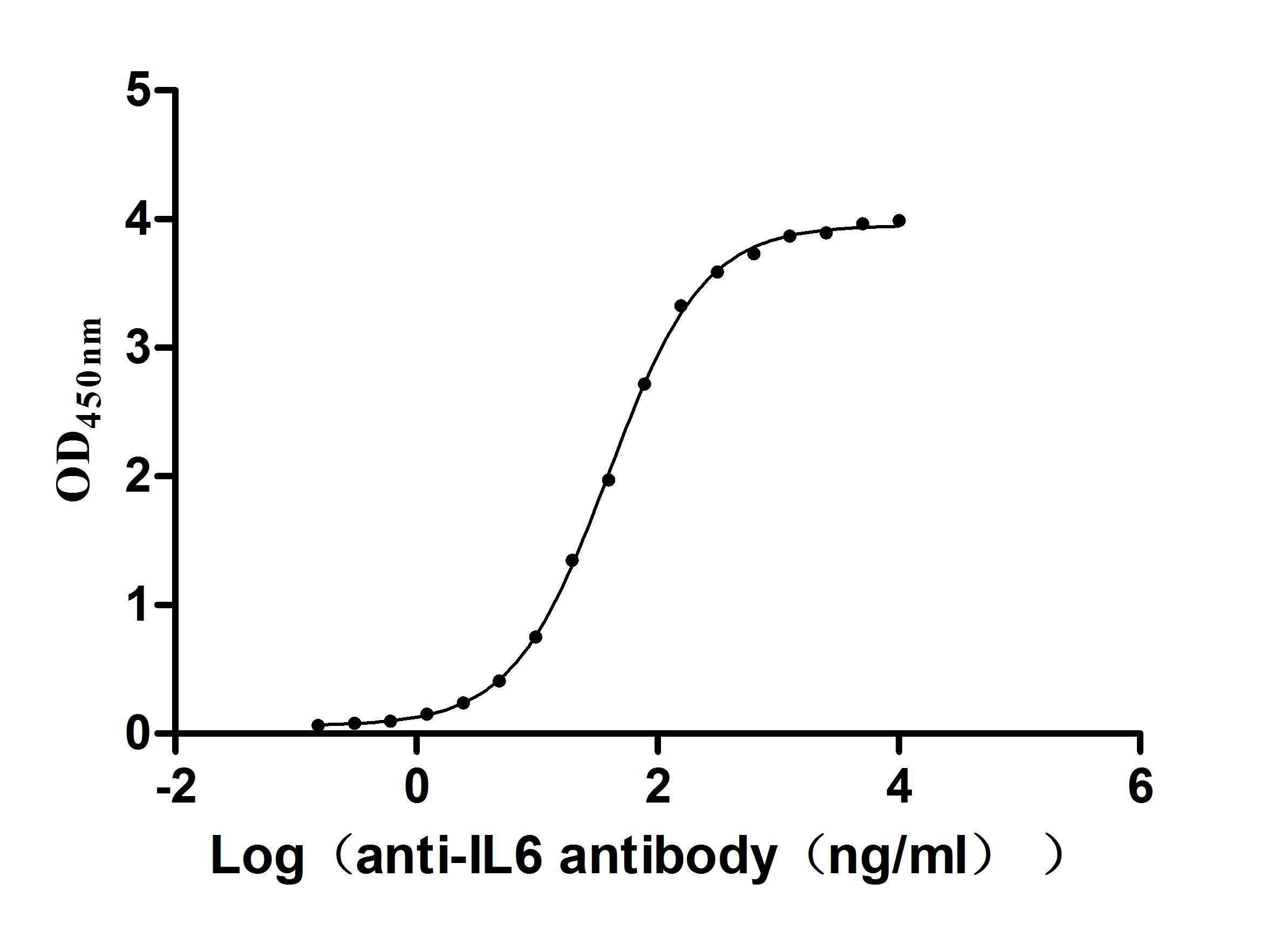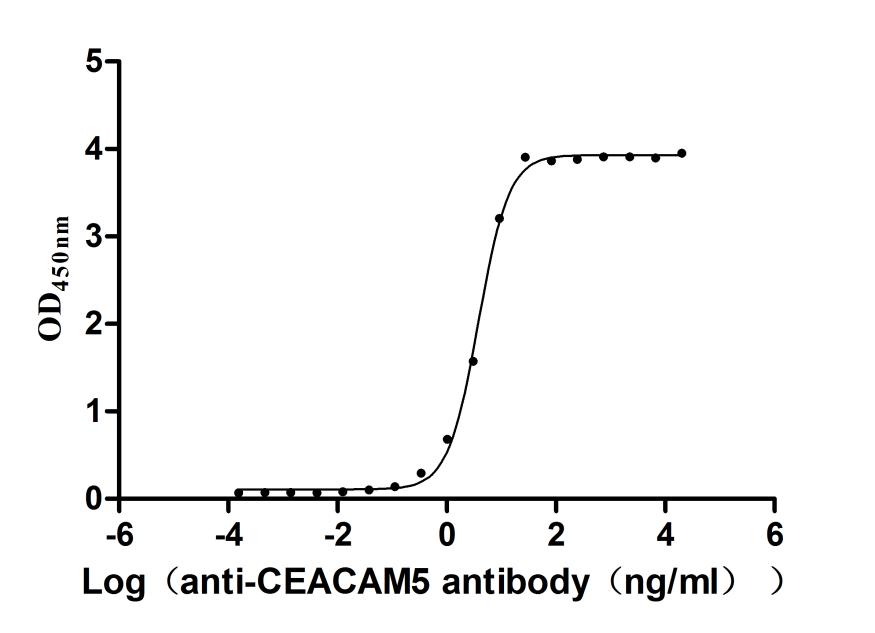Recombinant Human Tyrosine-protein phosphatase non-receptor type 2 (PTPN2)
-
货号:CSB-YP019031HU
-
规格:
-
来源:Yeast
-
其他:
-
货号:CSB-EP019031HU
-
规格:
-
来源:E.coli
-
其他:
-
货号:CSB-EP019031HU-B
-
规格:
-
来源:E.coli
-
共轭:Avi-tag Biotinylated
E. coli biotin ligase (BirA) is highly specific in covalently attaching biotin to the 15 amino acid AviTag peptide. This recombinant protein was biotinylated in vivo by AviTag-BirA technology, which method is BriA catalyzes amide linkage between the biotin and the specific lysine of the AviTag.
-
其他:
-
货号:CSB-BP019031HU
-
规格:
-
来源:Baculovirus
-
其他:
-
货号:CSB-MP019031HU
-
规格:
-
来源:Mammalian cell
-
其他:
产品详情
-
纯度:>85% (SDS-PAGE)
-
基因名:
-
Uniprot No.:
-
别名:Protein tyrosine phosphatase non receptor type 2; PTN2; PTN2_HUMAN; PTPN 2; Ptpn2; PTPT; T cell protein tyrosine phosphatase; T-cell protein-tyrosine phosphatase; TC PTP; TCELLPTP; TCPTP; Tyrosine protein phosphatase non receptor type 2; Tyrosine-protein phosphatase non-receptor type 2
-
种属:Homo sapiens (Human)
-
蛋白长度:Full length protein
-
表达区域:1-415
-
氨基酸序列MPTTIEREFE ELDTQRRWQP LYLEIRNESH DYPHRVAKFP ENRNRNRYRD VSPYDHSRVK LQNAENDYIN ASLVDIEEAQ RSYILTQGPL PNTCCHFWLM VWQQKTKAVV MLNRIVEKES VKCAQYWPTD DQEMLFKETG FSVKLLSEDV KSYYTVHLLQ LENINSGETR TISHFHYTTW PDFGVPESPA SFLNFLFKVR ESGSLNPDHG PAVIHCSAGI GRSGTFSLVD TCLVLMEKGD DINIKQVLLN MRKYRMGLIQ TPDQLRFSYM AIIEGAKCIK GDSSIQKRWK ELSKEDLSPA FDHSPNKIMT EKYNGNRIGL EEEKLTGDRC TGLSSKMQDT MEENSESALR KRIREDRKAT TAQKVQQMKQ RLNENERKRK RWLYWQPILT KMGFMSVILV GAFVGWTLFF QQNAL
-
蛋白标签:Tag type will be determined during the manufacturing process.
The tag type will be determined during production process. If you have specified tag type, please tell us and we will develop the specified tag preferentially. -
产品提供形式:Lyophilized powder
Note: We will preferentially ship the format that we have in stock, however, if you have any special requirement for the format, please remark your requirement when placing the order, we will prepare according to your demand. -
复溶:We recommend that this vial be briefly centrifuged prior to opening to bring the contents to the bottom. Please reconstitute protein in deionized sterile water to a concentration of 0.1-1.0 mg/mL.We recommend to add 5-50% of glycerol (final concentration) and aliquot for long-term storage at -20℃/-80℃. Our default final concentration of glycerol is 50%. Customers could use it as reference.
-
储存条件:Store at -20°C/-80°C upon receipt, aliquoting is necessary for mutiple use. Avoid repeated freeze-thaw cycles.
-
保质期:The shelf life is related to many factors, storage state, buffer ingredients, storage temperature and the stability of the protein itself.
Generally, the shelf life of liquid form is 6 months at -20°C/-80°C. The shelf life of lyophilized form is 12 months at -20°C/-80°C. -
货期:Delivery time may differ from different purchasing way or location, please kindly consult your local distributors for specific delivery time.Note: All of our proteins are default shipped with normal blue ice packs, if you request to ship with dry ice, please communicate with us in advance and extra fees will be charged.
-
注意事项:Repeated freezing and thawing is not recommended. Store working aliquots at 4°C for up to one week.
-
Datasheet :Please contact us to get it.
相关产品
靶点详情
-
功能:Non-receptor type tyrosine-specific phosphatase that dephosphorylates receptor protein tyrosine kinases including INSR, EGFR, CSF1R, PDGFR. Also dephosphorylates non-receptor protein tyrosine kinases like JAK1, JAK2, JAK3, Src family kinases, STAT1, STAT3 and STAT6 either in the nucleus or the cytoplasm. Negatively regulates numerous signaling pathways and biological processes like hematopoiesis, inflammatory response, cell proliferation and differentiation, and glucose homeostasis. Plays a multifaceted and important role in the development of the immune system. Functions in T-cell receptor signaling through dephosphorylation of FYN and LCK to control T-cells differentiation and activation. Dephosphorylates CSF1R, negatively regulating its downstream signaling and macrophage differentiation. Negatively regulates cytokine (IL2/interleukin-2 and interferon)-mediated signaling through dephosphorylation of the cytoplasmic kinases JAK1, JAK3 and their substrate STAT1, that propagate signaling downstream of the cytokine receptors. Also regulates the IL6/interleukin-6 and IL4/interleukin-4 cytokine signaling through dephosphorylation of STAT3 and STAT6 respectively. In addition to the immune system, it is involved in anchorage-dependent, negative regulation of EGF-stimulated cell growth. Activated by the integrin ITGA1/ITGB1, it dephosphorylates EGFR and negatively regulates EGF signaling. Dephosphorylates PDGFRB and negatively regulates platelet-derived growth factor receptor-beta signaling pathway and therefore cell proliferation. Negatively regulates tumor necrosis factor-mediated signaling downstream via MAPK through SRC dephosphorylation. May also regulate the hepatocyte growth factor receptor signaling pathway through dephosphorylation of the hepatocyte growth factor receptor MET. Plays also an important role in glucose homeostasis. For instance, negatively regulates the insulin receptor signaling pathway through the dephosphorylation of INSR and control gluconeogenesis and liver glucose production through negative regulation of the IL6 signaling pathways. May also bind DNA.
-
基因功能参考文献:
- The results provide the first indication that PTPN2 variants contribute to the risk of Type 1A diabetes, and possibly induce non-specific Type 1A diabetes. PMID: 29247561
- PTPN2, an anti-inflammatory factor regulated by VDR, was reduced in type 2 diabetics with chronic kidney disease stages 1-2. PMID: 30246029
- PTPN2 genetic polymorphisms are associated with psoriasis in the Northeastern Chinese population. PMID: 30266502
- PTPN2 rs2847297 and rs2847282 may be potential susceptible loci for lung cancer risk. PMID: 28400551
- Data suggests that SNPs in PTPN2/22 affect the negative regulation of the immune response in Crohn's disease patients, thus leading to an increase in inflammation/apoptosis and susceptibility of mycobacteria. PMID: 29456405
- In summary, we demonstrate that TCPTP protects the intestinal epithelial barrier by restricting STAT-induced claudin-2 expression. PMID: 28804910
- PASD1 serves as a critical nuclear positive regulator of STAT3-mediated gene expression and tumorigenesis. PMID: 26892021
- PTPN2_rs1893217 CC was associated with a lower risk of having joints with Limitation of motion in patients with Juvenile Idiopathic Arthritis. PMID: 28145159
- reported that SNPs in STAT4, PTPN2, PSORS1C1, and TRAF3IP2 are associated with response to TNF-i treatment in RA patients; however, these findings should be validated in a larger population PMID: 28107378
- The results suggest that miR-448 might promote Th17 differentiation in multiple sclerosis and thus aggravate the disease through inhibiting PTPN2. PMID: 28342869
- ACPA were associated significantly with rs7574865 in STAT-4. The SNP rs2233945 in the PSORS1C1 gene was protective regarding the presence of bone erosions, while rs2542151 in PTPN2 gene was associated with joint damage. PMID: 27342690
- Inflammatory bowel disease patients carrying the C-allele of PTPN2 SNP rs1893217 are at greater risk for developing a severe disease course but are more likely to respond to treatment with anti-TNF antibodies. PMID: 26928573
- The increase in miR-210 resulted in down regulation of its target PTPN2 mRNA in pre-eclampsia. PMID: 27746364
- role of PTPN2 in type 1 diabetes and Crohn's disease (review) PMID: 26734582
- rs2542151 SNP in The PTPN2 gene is associated with T1DM in Chinese Han children PMID: 26344020
- Loss of protein tyrosine phosphatase, non-receptor type 2 is associated with activation of AKT and tamoxifen resistance in breast cancer. PMID: 26208487
- Angiopoietin-1 Regulates Brain Endothelial Permeability through PTPN-2 Mediated Tyrosine Dephosphorylation of Occludin PMID: 26090670
- dysfunction of PTPN2 results in aberrant T-cell differentiation and intestinal dysbiosis similar to those observed in human CD. Our findings indicate a novel and crucial role for PTPN2 in chronic intestinal inflammation. PMID: 25492475
- PTPN2 is linked to the pathogenesis of rheumatoid arthritis via synovial fibroblasts. It is a regulator of lnterleukin-6 production in rheumatoid arthritis synovial fibroblasts. PMID: 26139109
- demonstrate that SIPAR directly interacts with T cell protein tyrosine phosphatase TC45 and enhances its association with STAT3 PMID: 26026268
- Single-nucleotide polymorphism in PTPN2 gene is associated with Crohn's disease. PMID: 25489960
- The PTPN2 rs1893217 polymorphism is not significantly associated with type 1 diabetes mellitus in Caucasian subjects from Southern Brazil. PMID: 24936733
- PTPN2 and genes of the vitamin D pathway may have roles in risk of juvenile idiopathic arthritis PMID: 25460303
- A family wad heterozygous for risk variants of the genes encoding NOD2 and TLR5 and homozygous carriers of PTPN2 risk alleles in Crohn disease. PMID: 24901824
- PTPN2 variant rs1893217 was associated with risk of Behcet disease development in a Han Chinese population. PMID: 24480412
- Associations were observed between PTPN2 polymorphisms and susceptibility to ulcerative colitis and Crohn's disease. PMID: 24127071
- The type 1 diabetes candidate gene BACH2 regulates proinflammatory cytokine-induced apoptotic pathways in pancreatic beta-cells by crosstalk with another candidate gene, PTPN2, and activation of JNK1 and BIM. PMID: 24608439
- Dtat indicate that activation of protein tyrosine phosphatase non-receptor type 2 (PTPN2) by spermidine ameliorates IFN-gamma-induced inflammatory responses in THP-1 cells. PMID: 24040033
- Association of the PTPN2 locus (encoding the T cell protein tyrosine phosphastase) with Caucasian rheumatoid arthritis susceptibility. [Meta-analysis] PMID: 23840476
- spermidine increased both TCPTP protein levels and enzymatic activity, correlating with a decrease in the phosphorylation of the signal transducers and activators of transcription 1 and 3, downstream mediators of IFN-gamma signaling PMID: 24022492
- Single nucleotide polymorphisms in the PTPN2 gene is associated with Crohn's disease. PMID: 23518806
- Reactive oxygen species-responsive miR-210 regulates proliferation and migration of adipose-derived stem cells via PTPN2. PMID: 23579275
- A yeast two-hybrid screen identified several unique interacting partners of TCPTP(TC48) belonging to two groups - proteins involved in vesicle trafficking and proteins involved in cell adhesion PMID: 23328081
- the association between TCPTP cleavage and viral replication may have important consequences for the HCV life cycle and HCV-induced liver diseases PMID: 23454379
- The study indicates that IL23R-rs11805303 and PTPN2-rs2542151 might contribute to the development of ulcerative colitis and NOD2-P268S might be involved in the etiology of Crohn's disease in the Chinese Han population. PMID: 22426692
- TCPTP deficiency in human breast cancer cell lines enhances Src family PTKs and STAT3 signaling. PMID: 23166300
- TC48 dephosphorylates BCR-Abl but not c-Abl and inhibits its activity towards its substrate. PMID: 23124138
- Progression to type I diabetes in islet autoimmunity-positive children was associated with the VDR rs2228570 GG genotype and there was an interaction between VDR rs1544410 and PTPN2 rs1893217. PMID: 22960018
- phospho-Ser727 determines the duration of STAT3 activity largely through TC45. PMID: 22233524
- Genome-wide association studies have identified single nucleotide polymorphisms within the gene locus encoding protein tyrosine phosphatase nonreceptor type 2 (PTPN2) as a risk factor for the development of chronic inflammatory diseases PMID: 22671594
- These data identify an important functional role for PTPN2 as a protector of the intestinal epithelial barrier and provide clues as to how PTPN2 mutations may contribute to the pathophysiology of CD. PMID: 22671596
- Loss of PTPN2 is associated with the onset and perpetuation of chronic intestinal inflammation. PMID: 21987459
- c-Src is capable of phosphorylating tyr residues of c-Fos whereas the phosphatase TC45 T-cell protein-tyr phosphatase (TC-PTP) dephosphorylates them PMID: 22105363
- single nucleotide polymorphism in PTPN2 gene is associated with Crohn's disease. PMID: 22021207
- An association of the PTPN2 and IL2RA genes with juvenile idiopathic arthritis was found. PMID: 22294642
- data confirm the association of PTPN2 variants with susceptibility to both Crohn's disease and ulcerative colitis, suggesting a common disease pathomechanism for these diseases PMID: 22457781
- A positive correlation was observed between mRNA expression of PTPN2 and NKX2-3 in B cells and in intestinal tissues from both Crohn's disease and ulcerative colitis patients. PMID: 22377701
- PTPN2 is a tumor suppressor gene in T-cell malignancies. PMID: 21791476
- The possibility of cellular phospho-C3G (pC3G) being a substrate of the intracellular T-cell protein tyrosine phosphatase TC-PTP (PTPN2) using the human neuroblastoma cell line, was studied. PMID: 21876762
- Data suggest association of PTPN2 deletion in T-ALL with activating JAK1 mutations. Data confirm strong association of PTPN2 deletion with TLX1 and NUP214-ABL1 expression. PTPN2 down-regulation reduces lymphoid cell sensitivity to JAK inhibition. PMID: 21551237
显示更多
收起更多
-
亚细胞定位:[Isoform 1]: Endoplasmic reticulum. Endoplasmic reticulum-Golgi intermediate compartment.; [Isoform 2]: Nucleus. Cytoplasm. Cell membrane.
-
蛋白家族:Protein-tyrosine phosphatase family, Non-receptor class 1 subfamily
-
组织特异性:Ubiquitously expressed. Isoform 2 is probably the major isoform. Isoform 1 is expressed in T-cells and in placenta.
-
数据库链接:
HGNC: 9650
OMIM: 176887
KEGG: hsa:5771
STRING: 9606.ENSP00000311857
UniGene: Hs.654527
Most popular with customers
-
Recombinant Human Angiotensin-converting enzyme 2 (ACE2), partial (Active)
Express system: Mammalian cell
Species: Homo sapiens (Human)
-
Recombinant Human Receptor tyrosine-protein kinase erbB-3 (ERBB3), partial (Active)
Express system: Mammalian cell
Species: Homo sapiens (Human)
-
Recombinant Human IGF-like family receptor 1 (IGFLR1), partial (Active)
Express system: Mammalian cell
Species: Homo sapiens (Human)
-
Recombinant Macaca mulatta Microtubule-associated protein tau (MAPT) (Active)
Express system: Mammalian cell
Species: Macaca mulatta (Rhesus macaque)
-
Recombinant Human CD70 antigen (CD70), partial (Active)
Express system: Mammalian cell
Species: Homo sapiens (Human)
-
Recombinant Macaca fascicularis Transmembrane 4 L6 family member 1 (TM4SF1)-VLPs (Active)
Express system: Mammalian cell
Species: Macaca fascicularis (Crab-eating macaque) (Cynomolgus monkey)
-
-
Express system: Mammalian cell
Species: Macaca mulatta (Rhesus macaque)


